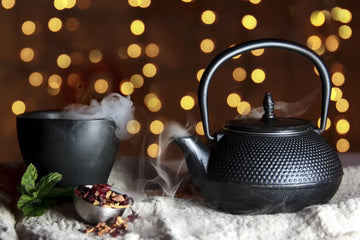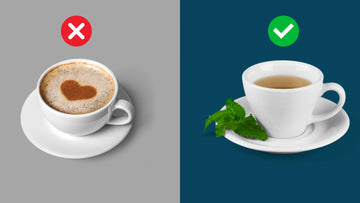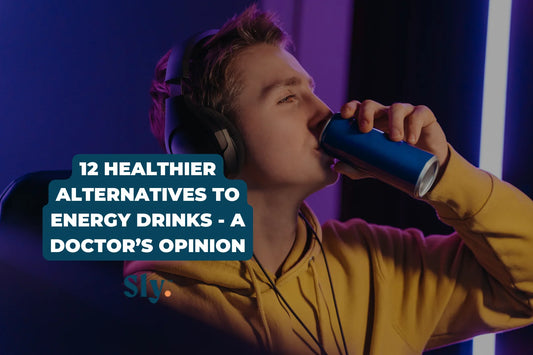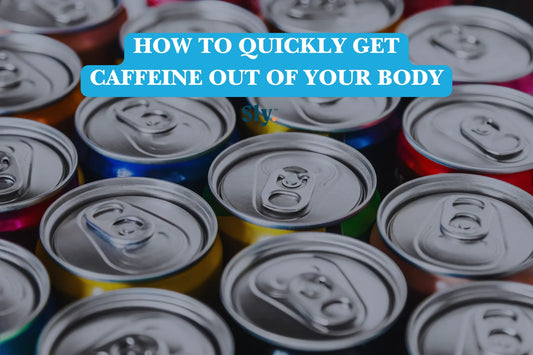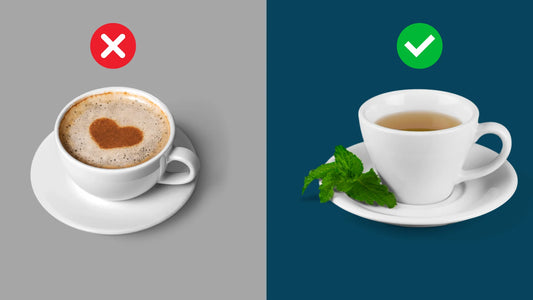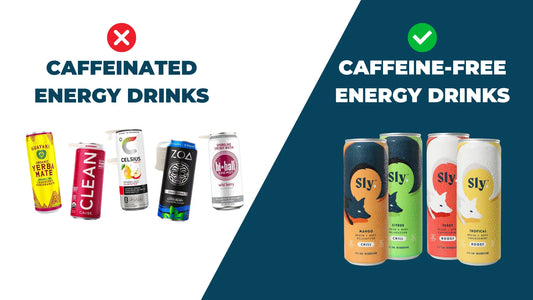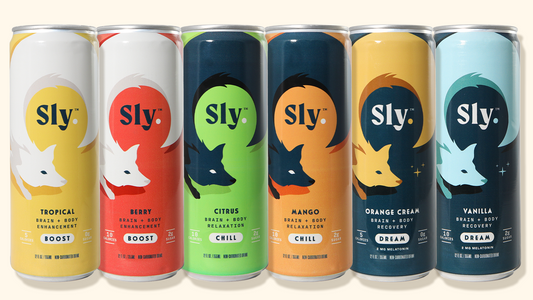
Energy Drink Side Effects: A Doctor's Opinion
Energy drinks are more and more popular each year, and the amount of health issues it causes for people, especially teenagers is becoming more and more concerning to parents, athletes, and sports enthusiasts.
They're marketed as a quick and easy way to boost energy, mental alertness, and physical performance. However, there are harmful side effects to energy drinks that aren't talked about enough.
In this article, I've covered the main health risks that come with energy drinks and why you should switch to healthier, more natural alternatives.
What are energy drinks?
Energy drinks are beverages designed to give a quick boost of energy. They usually contain high levels of caffeine, around 31mg of caffeine per 100g serving. To put this into perspective, a cup of coffee typically contains about 95mg of caffeine. Energy drinks also often have a high amount of sugar or fructose corn syrup, artificial sweeteners, and stimulants such as guarana, ginseng, and ephedrine.
A doctor's opinion on energy drinks
Most energy drinks do a good job of providing energy or mental alertness, but the health risks are simply not worth it. Their use has been linked to various health concerns, such as increased heart rate, high blood pressure, cardiac arrhythmias, and sometimes even death by overdose.
In teenagers and young adults, it also impacts the development of important cardiovascular and nervous systems.
Negative effects of drinking energy drinks
Consuming energy drinks can lead to multiple negative effects in the body, mostly due to the excessive amount of caffeine.
The main problem that causes this is not knowing when to stop. Unlike coffee, with energy drinks, you don't feel like you're consuming too much caffeine, which makes it easier to consume too much.
Heart Issues
The high amount of caffeine in energy drinks can affect heart rate, blood pressure, and cardiac function. Studies show that overconsuming energy drinks can lead to irregular heartbeat, high blood pressure, cardiac arrhythmias, and, in rare cases, cardiac arrest.
Caffeine makes your heart beat faster and disrupts normal heart rhythm, which is problematic for people with heart conditions or high blood pressure.
Psychological Issues
Energy drinks and caffeine are known to improve reaction time and increase mental alertness, but that's only during "the kick".
Excessive consumption can lead to psychological issues such as anxiety, irritability, and restlessness. It can also affect sleep patterns, leading to sleep disturbances and insomnia.
Over time, your body develops a tolerance to caffeine, which means you have to consume more to feel the effects, and if you don't, the withdrawal symptoms make things even worse.
Stomach Issues
The high amount of sugar, artificial sweeteners, and stimulants that are in energy drinks can lead to gastrointestinal discomfort, including stomachaches, nausea, and indigestion. Overconsumption of energy drinks can also lead to acid reflux and heartburn.
The body will struggle to process a large amount of sugar and artificial sweeteners, which leads to digestive issues, and increased stomach acid production.
Potential Damage to Renal Function
Renal function, or kidney health, can also be an issue when it comes to energy drink consumption. The high caffeine content in these drinks can have a diuretic effect, which leads to increased urine production. While this diuretic effect is generally mild, consuming too many energy drinks can strain the kidneys and affect their function.
Caffeine may put additional pressure on the kidneys, which may impact their ability to filter waste products from the blood efficiently.
Side Effects of Too Much Caffeine
Let's face it, unhealthy sugars, artificial sweeteners, and other stimulants are in the majority of popular drinks and sodas. The real issue with energy drinks is the amount of caffeine they contain and how easy it is to overconsume. Here are the potential side effects of drinking caffeinated energy drinks.
Increased Urination
Caffeine, whether from energy drinks, coffee, or other sources, can have a diuretic effect. This means that it increases urine production and sends you to the toilet more often. While this is generally a mild side effect, excessive caffeine intake, such as from energy drinks, can result in dehydration if you don't drink enough water.
Increased Body Temperature
Caffeine is a chemical stimulant that can affect the body's ability to regulate its internal temperature. High levels of caffeine can increase body temperature, which leads to feelings of restlessness or discomfort.
Faster Breathing and Heart Rate
Caffeine stimulates the central nervous system and leads to an increase in heart rate and respiratory rate, which gives you the feeling of mental alertness and increased energy. However, drink too much and you'll notice a rapid heartbeat and faster breathing, which can cause anxiety in some.
Insomnia
One of the most well-known side effects of caffeine consumption is its ability to disrupt sleep patterns, especially if you drink it in the evenings before bed. Even caffeine consumed earlier in the day can have effects that negatively impact sleep quality.
Headache
Caffeine is usually taken as a relief from headaches or stress, but for some people, it works as the complete opposite, causing the blood vessels in the brain to constrict, triggering headaches and pain.
Muscle Tremors
Have you ever tried holding your hands in the air and saw them shake for no apparent reason? Well, it's the caffeine causing muscle tremors by stimulating the central nervous system. This isn't considered a health problem, but it's a mild and temporary discomfort not everyone can tolerate.
Who should avoid caffeine?
Coffee and energy drinks are usually considered safe for most people when consumed in moderation. However, certain people should fully avoid caffeine intake, including coffee, energy drinks, and other sources.
These people are individuals with health and heart conditions, pregnant women, and those with caffeine sensibilities.
Young athletes too, should be cautious when consuming caffeine, as combining heavy training and caffeine can lead to increased heart rate, dehydration, and other health issues. It's best to stick with water or sports drink specifically made for athletic performance and rehydration.
How Much Energy Drink is Safe?
The recommended daily limit for drinking energy drinks is 480mL of energy drinks and 400mg of caffeine per day, which is the same as drinking 4 cups of coffee. Most energy drink labels recommend a maximum of 2x 250mL or 1x 500mL intake. Avoid drinking in the evenings or before bed.
Is it OK to drink energy drinks every day?
No, it is not recommended to drink energy drinks every day. Everyday consumption of energy drinks can increase the risk of caffeine dependence, heart issues, obesity, sleep disturbances, digestive problems, and mental health problems.
The long-term effects of energy drinks and caffeine are harmful, especially for young adults and teenagers in the ages of growth and development.
Is 500mL of energy drinks a day bad?
500 mL of energy drinks is the maximum recommended amount of energy drinks you should consume in a day. However, this doesn't mean you should drink them every single day.
Consuming energy drinks on a daily basis is linked to various health issues and heart problems, so it's best to take it easy on the energy drinks.
What's inside an energy drink?
To understand the effects of energy drinks, it's important to know what they contain. Here's what's often found in energy drinks:
Taurine
Taurine is an amino acid commonly found in energy drinks. It plays a role in supporting physical performance and mental alertness. Taurine is naturally produced by the body and is also found in some foods, such as meat and fish. In energy drinks, it is often added for its potential to enhance energy levels, improve mental performance, and support physical endurance.
Guarana
Guarana is a natural stimulant that is derived from the seeds of a plant native to South America. It is often included in energy drinks for its high caffeine content, which can provide a quick boost of energy. Guarana is believed to enhance energy levels, mental alertness, and physical performance, making it a popular ingredient in these beverages.
Guarana in energy drinks can also cause multiple side effects, including headaches, dizziness, nausea, high blood sugar, and dehydration.
Glucuronolactone
Glucuronolactone is a naturally occurring substance in the human body and is also found in certain fruits and vegetables. It is included in energy drinks for its potential to support energy levels and mental alertness. While more research is needed to fully understand its effects, glucuronolactone is believed to contribute to the overall energy-boosting properties of energy drinks.
Caffeine
Caffeine is the primary stimulant found in energy drinks, and its effects on energy levels, mental alertness, and physical performance are well-known. The caffeine content of energy drinks can vary, but it is important to note that they often contain higher levels of caffeine compared to other beverages. Caffeine acts as a central nervous system stimulant and can temporarily increase energy levels, enhance mental focus, and improve reaction time.
Sly's Caffeine-Free Energy Drink: A Healthier Alternative
With 20+ years of medical experience, Dr. Thomas Czyz and his wife, Dr. Amy Czyz, have seen 80,000+ patients get involved in the beverage industry.
We decided to create an energy drink that is healthy, caffeine-free, and still provides the same amount of energy and mental clarity as other energy drinks. We both had to wear many hats running optometry practices, being parents to three daughters growing up, and learning about the CPG business to develop a brand. - Dr. Thomas Czyz

The Story Behind Sly
Dr. Amy and Dr. Tom have been optometrists for over 20 years.
Dr. Amy was a big Diet Coke drinker and had a particular hatred of water.
She then started using "flavor sticks" in water... what Dr. Tom likes to call "cancer sticks".
So, out of the frustration of not finding what she wanted to drink, Dr. Amy decided to develop healthy drinks that she could drink.
But, they both wanted it to have a purpose that was based on our Sleep-Wake Cycle or Circadian Rhythm. Hence was born the term, "Circadian Beverages®"
Ingredients of Sly BOOST energy drink
Sly BOOST energy drink is made with carefully selected ingredients that provide natural energy without caffeine. It includes ingredients known for their ability to enhance energy levels and mental performance, such as vitamins, minerals, and natural botanical extracts. These ingredients work together to provide a sustained energy boost without the side effects of caffeine consumption.
Sly BOOST energy drink is made with healthy ingredients and no caffeine
- Reverse Osmosis Water,
- Natural Flavors
- Organic Honey
- Citric Acid
- Alpha GPC (Alpha Glycerylphosphorylcholine)
- Acetyl L-Carnitine
- Rhodiola Rosea Extract
- Bilberry Extract
- Potassium Sorbate and Sodium Benzoate (to preserve freshness)
- Potassium Citrat
- L-Tyrosine
- L-Theanine
- Stevia Extract
- Vitamin B3 (Niacinamide)
- Vitamin B5 (D-Calcium Pantothenate)
- Vitamin B6 (Pyridoxine Hydrochloride)
- Zinc Citrate
- Vitamin B12 (Cyanocobalamin)
Health Benefits
Sly BOOST is proven to energize your mind and strengthen your mental clarity, alertness, and endurance while working to reduce stress and fatigue without caffeine or sugar.
Many energy drinks today risk heart health by exceeding daily caffeine recommendations. BOOST is a zero-caffeine energy drink with low or no sugar at 2g or less and 10 kcal or less.
It's great for students looking for study aid, gamers who want to enhance gameplay, hydration, and improve gaming performance.
It comes in two delicious flavors: berry and tropical.
What Should I Replace Energy Drinks With?
There are multiple healthier options and alternatives to energy drinks. Here are some of the main ones.
Black Tea
Black tea is a popular choice for those seeking a natural energy boost. It contains caffeine, but in lower amounts compared to energy drinks.
Black tea also has the additional benefits of antioxidants, which support overall health.

Kombucha
Kombucha is a fermented tea drink that provides a natural energy boost, along with the potential benefits of probiotics.
Probiotics are beneficial bacteria that help with digestive health, immunity, and overall well-being. Kombucha is available in pretty much every flavor out there, making it a refreshing alternative to energy drinks.

Coconut Water
Coconut water is another excellent replacement for energy drinks, especially for those looking to refill fluids and electrolytes after physical activity. Coconut water naturally contains electrolytes, such as potassium and magnesium, which can help restore hydration and energy levels. It is a refreshing, healthier, and more natural option than energy drinks that provides essential nutrients without the added caffeine and sugar.
Sparkling Water
Sparkling water, also known as carbonated water, is a simple yet effective alternative to energy drinks. It provides hydration without the high sugar, caffeine, or artificial additives found in energy drinks. Sparkling water can be found plain or flavored with a splash of citrus, making it a refreshing and calorie-free option.
Sly BOOST
Sly BOOST, a caffeine-free energy drink, is an excellent alternative to traditional energy drinks. It offers the benefits of natural energy without the side effects of caffeine. Sly BOOST is proven to energize your mind and strengthen your mental clarity, alertness, and endurance while working to reduce stress and fatigue without caffeine or sugar.
Frequently Asked Questions
How do you flush caffeine out of your system?
Caffeine is a stimulant that is metabolized by the liver. The rate at which caffeine is metabolized is different for each person, but on average, it takes about 5-6 hours for the effects of caffeine to wear off. To help flush caffeine out of your system, you can:
- Drink plenty of water and stay hydrated, which can support the body's natural detoxification processes.
- Consume foods high in antioxidants, such as fruits and vegetables, which can help neutralize free radicals and support overall health.
- Engage in physical activity, as exercise can speed up the metabolism and help eliminate caffeine from the body.
- Be patient, as caffeine elimination takes time, and it may take several hours for caffeine to completely leave your system.
Will less caffeine improve sleep?
You should avoid caffeine at least 8 hours before bedtime to improve sleep quality. Studies have shown that consuming caffeine 6 hours within bedtime prolonged sleep latency by 12-16min and reduced total sleep time by 25-30min.
These results can vary from person to person, but it's generally recommended to avoid caffeine before bedtime.
How long does the caffeine effect last
It takes from 15 to 60 minutes to feel the effects of caffeine, and the effects continue for approximately 3 to 5 hours after consumption.
For some, caffeine may not be completely clear from the bloodstream until after 10 hours.
Are energy drinks addictive?
Caffeine found in energy drinks is a psychoactive stimulant drug and, like other drugs, is highly addictive.
Some signs of energy drink addiction include strong cravings, a mental image of drinking energy drinks, and the inability to control energy drink intake.
Another major sign is experiencing withdrawal symptoms when you try to stop drinking energy drinks, such as headaches, irritability, and fatigue.
Conclusion
It's important to carefully consider the risk/reward ratio that comes with energy drinks.
Are you sure that it's worth trading long-term health for a short-term energy spike?
For teenagers and young adults, we strongly recommend staying away from energy drinks, as it's simply not worth it, and taking care of your health should always be your main priority.

